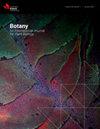Three helmet-orchid species share abundant fungi of Serendipitaceae regardless of altitude
IF 1.3
4区 生物学
Q3 PLANT SCIENCES
引用次数: 0
Abstract
Botany, Ahead of Print.The tiny terrestrial orchids (plant height less than 8 cm) in the genus Corybas dependent on mycorrhizal fungal (OMF) partners for seed germination and seedling development. The OMF community of the Corybas remains poorly understood, although the relevant knowledge is very important for in situ and ex situ conservation of these orchids. In this study, we characterized OMF richness and compositions of three helmet-orchid species, i.e., Corybas geminigibbus, C. himalaicus, and C. shanlinshiensis, from their natural habitats by using Illumina sequencing of the internal transcribed spacer 2 region. We found that fungal colonization was restricted in the rhizomes of the helmet-orchids instead of their tuberoids, and serendipitoid fungi were predominant, while tulasnelloid were absent in the three investigated Corybas species regardless of their altitude. The three Corybas species shared 27 serendipitoid operational taxonomic units that are different to those of their related orchids, the genera of Cyrtostylis and Stigmatodactylus. Corybas shanlinshiensis alone had a range of ectomycorrhizal fungi (mainly russuloid and thelephoroid) broader than C. himalaicus and C. geminigibbus. Our study provides new information about terrestrial orchid–fungi associations and may further contribute to orchid conservation.
三种头盔兰不受海拔高度的限制,共享丰富的半知菌科真菌
Botany, Ahead of Print. 科里巴斯属(Corybas)的小型陆生兰花(植株高度小于 8 厘米)依赖菌根真菌(OMF)伙伴进行种子发芽和幼苗生长。尽管相关知识对这些兰花的就地和异地保护非常重要,但人们对科里巴斯属的 OMF 群落仍然知之甚少。在这项研究中,我们利用 Illumina 内部转录间隔 2 区测序技术,鉴定了三个头盔兰物种(Corybas geminigibbus、C. himalaicus 和 C. shanlinshiensis)在自然栖息地的 OMF 丰富度和组成。我们发现,真菌定殖仅限于头盔兰的根茎,而不是其块根,而且丝核菌占主导地位,而在所研究的三个 Corybas 物种中,无论海拔高低,都不存在块根真菌。这三个 Corybas 种类共有 27 个丝状真菌操作分类单元,这些单元与其相关的兰花属、Cyrtostylis 属和 Stigmatodactylus 属不同。只有 Corybas shanlinshiensis 的外生菌根真菌(主要是 Russuloid 和 thelephoroid)范围比 C. himalaicus 和 C. geminigibbus 更广。我们的研究为陆生兰花与真菌的关系提供了新的信息,并可能为兰花保护做出进一步贡献。
本文章由计算机程序翻译,如有差异,请以英文原文为准。
求助全文
约1分钟内获得全文
求助全文
来源期刊

Botany
生物-植物科学
CiteScore
2.20
自引率
9.10%
发文量
48
期刊介绍:
Botany features comprehensive research articles and notes in all segments of plant sciences, including cell and molecular biology, ecology, mycology and plant-microbe interactions, phycology, physiology and biochemistry, structure and development, genetics, systematics, and phytogeography. It also publishes methods, commentary, and review articles on topics of current interest, contributed by internationally recognized scientists.
 求助内容:
求助内容: 应助结果提醒方式:
应助结果提醒方式:


